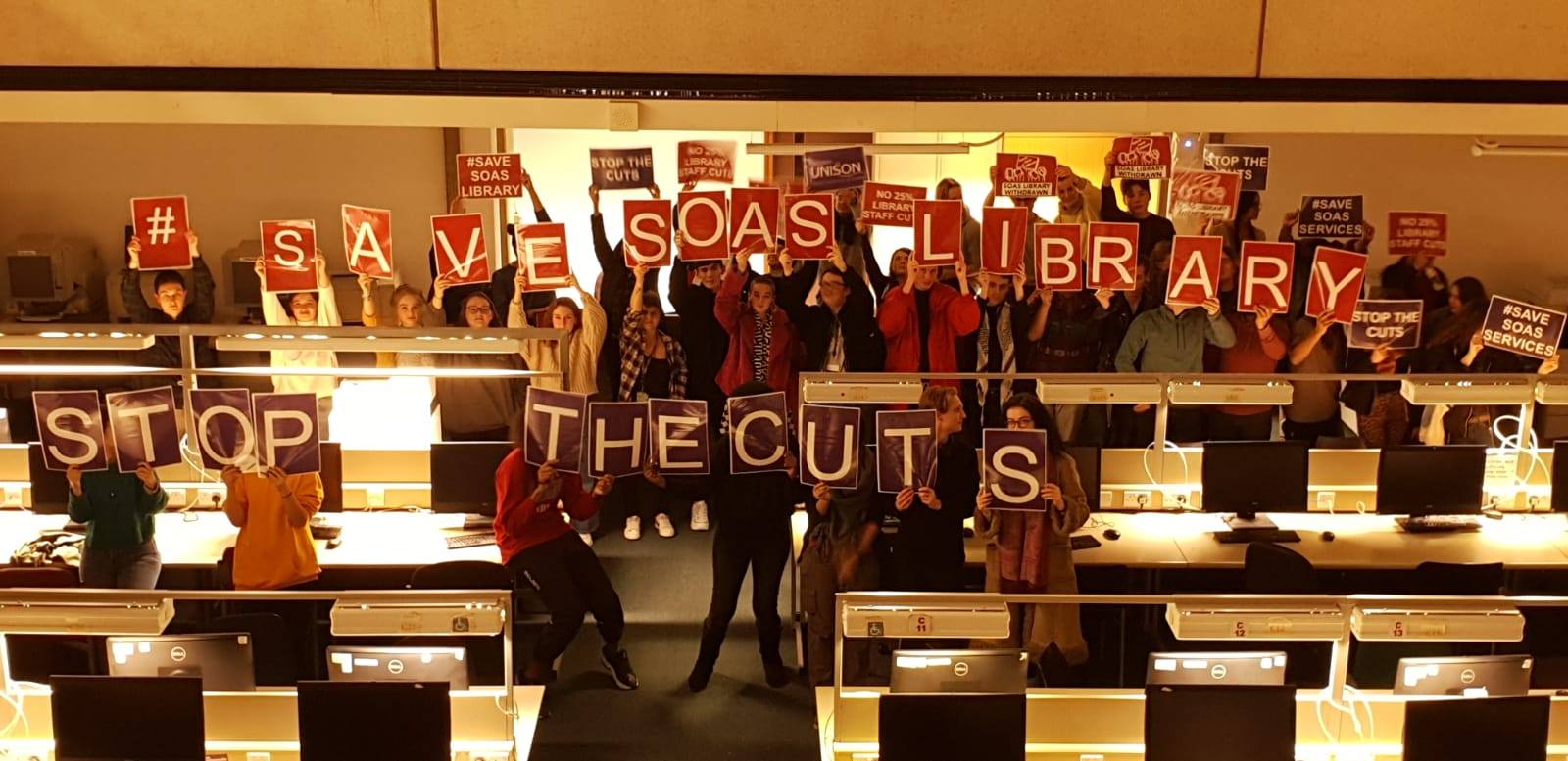Elizabeth Shwe, BA Politics – Exchange Student From Princeton
On multiple nights between 15 January and 3 February, a group of SOAS students provided 24-hour library services, or “sleepovers”, at the SOAS library to show solidarity with the library staff against the proposed cuts to the library and other services as part of the One Professional Services (OPS) restructure. Over 60 students attended the first sleepover and new people regularly joined in the following weeks.
“It is important to remember that as students, we are part of a wider community and sometimes we forget that the most important people in the institution are not just those who teach us, but every single person plays an important role in keeping the institution functioning”, the organisers of the sleepovers said anonymously.
SOAS is currently restructuring all its professional services departments and plans to make cuts of £650,000 – £675,000 to the library alone, which would result in the loss of 25% of current library staff.
The organisers hoped to provide a collective organising space for students who felt strongly about the issue and wanted to get involved. They also wanted to address the “vacuous notion of ‘student experience’”: a term that SOAS management has used to justify these cuts, as well as the vagueness on exactly how the restructuring would improve services to students.
“The school patronises students in saying that ‘you do not understand,’ but in reality, most of the senior managers have been at SOAS for less time than third-year undergraduates and some post-grad students. There is no scrutiny of the fact that some of them failed at their previous jobs and left their institutions in worse situations than when they joined and are doing the same at SOAS”, organisers said. Furthermore, “there has been no communication with the students from any of the official channels on explaining why it was happening, what the rationale was, why the library was being slashed, what the reduction in teaching staff and administration would mean, how an idea of ‘shrinking to get bigger’ makes sense”.
“The school patronises students in saying that ‘you do not understand,’ but in reality, most of the senior managers have been at SOAS for less time than third-year undergraduates and some post-grad students”.
Thus, engaging with SOAS management on the issues of these cuts was also one of their goals, and this was achieved through the Ask SOAS Managers forum and will continue in forthcoming events scheduled to take place.
The organisers decided to hold these acts of solidarity only during the nighttime, hence the term “sleepover,” so that students who needed to use the library during the day could do so without any disruptions. The cost was that it excluded people who were not able to stay on campus that late. However, the organisers also held planning sessions and other meetings during the day so that students who couldn’t attend the sleepover could still participate.
Several activities took place during these sleepovers: film screenings, crafting sessions, impromptu music sessions, and discussions on how the current institutional issues are impacting both students and workers. Students either slept overnight or only stayed for part of the night before going home. And others simply used this provided space to continue studying past the formal 11:30 pm closing time.
To get the word out, they asked various societies and campaigns on campus to share the event via mailing lists and social media platforms. They also distributed a statement and invitation, which can be found on Save SOAS Library’s Facebook page.
However, they received a limited amount of attention due to lack of available resources, specifically printing and gaining access to a mailing list for all of SOAS’s student body. The organisers stated, “It would have been great if more people joined, but the fact that the accountability forum managed to pack out the LLT showed that it was somewhat successful in reaching out to students”.
Though they played no part in the organising, Save SOAS Library happily agreed to help by sending out messages about the details of the sleepover on their Facebook page. Members of the Save SOAS Library campaign appreciated the act of solidarity and commented that they “are very grateful for students’ support for our campaign and the initiative that they took”. Save SOAS Library also commented that they did not hear of any particular difficulties as a consequence of the sleepovers and as far as they know, the sleepovers were peaceful.
It is difficult to say whether the sleepover was successful in its intended goals, especially because plans for the restructure have not been finalised. And it is challenging to evaluate the success of this one action in the context of many that have been organised against OPS restructure. Nevertheless, the sentiments are still strong with organisers stating, “Regardless of the bullying, intimidation, lies, defamation, and other tactics used to scare activists on campus, there is still a strong and vibrant resistance against management should they cut the library and other key services in a way that those working those jobs feel will negatively impact the institution and students”.
Photo Credits: Crisis SOAS
